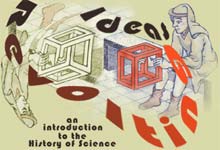
University of California, Irvine
Instructor: Dr. Barbara J. Becker

|
Week 10. New Worldview excerpt from
from Nuclear Physics (1953), pp. 200-202
|
It remained to determine the technical sequel to these results. In the United States, the final decision was taken to go for the production of atomic bombs, with an outlay that must have amounted to a considerable fraction of the total American war expenditure; in Germany an attempt was made to solve the problem of the prime mover [nuclear reactor] driven by nuclear energy, with an outlay of perhaps a thousandth part of the American. We have often been asked, not only by Germans but also by Britons and Americans, why Germany made no attempt to produce atomic bombs.
The simplest answer one can give to this question is this: because the project could not have succeeded under German war conditions. It could not have succeeded on technical grounds alone: for even in America, with its much greater resources in scientific men, technicians and industrial potential, and with an economy undisturbed by enemy action, the bomb was not ready until after the conclusion of the war with Germany. In particular, a German atomic bomb project could not have succeeded because of the military situation. In 1942, German industry was already stretched to the limit, the German Army had suffered serious reverses in Russia in the winter of 1941-42, and enemy air superiority was beginning to make itself felt. The immediate production of armaments could be robbed neither of personnel nor of raw materials, nor could the enormous plants required have been effectively protected against air attack.
Finally--and this is a most important fact--the undertaking could not even be initiated against the psychological background of the men responsible for German war policy. These men expected an early decision of the War, even in 1942, and any major project which did not promise quick returns was specifically forbidden. To obtain the necessary support, the experts would have been obliged to promise early results, knowing that these promises could not be kept. Faced with this situation, the experts did not attempt to advocate with the supreme command a great industrial effort for the production of atomic bombs.
From the very beginning, German physicists had consciously striven to keep control of the project, and had used their influence as experts to direct the work into the channels which have been mapped in the foregoing report. In the upshot they were spared the decision as to whether or not they should aim at producing atomic bombs. The circumstances shaping policy in the critical year of 1942 guided their work automatically towards the problem of the utilization of nuclear energy in prime movers. To a German physicist, this task seemed important enough. The mere possibility of solving the problem had been rendered possible by the discovery of the German Scientific workers Hahn and Strassmann; and so we could feel satisfied with the hope that the important technical developments, with a peace-time application, which must eventually grow out of their discovery, would likewise find their beginning in Germany, and in due course bear fruit there.
|